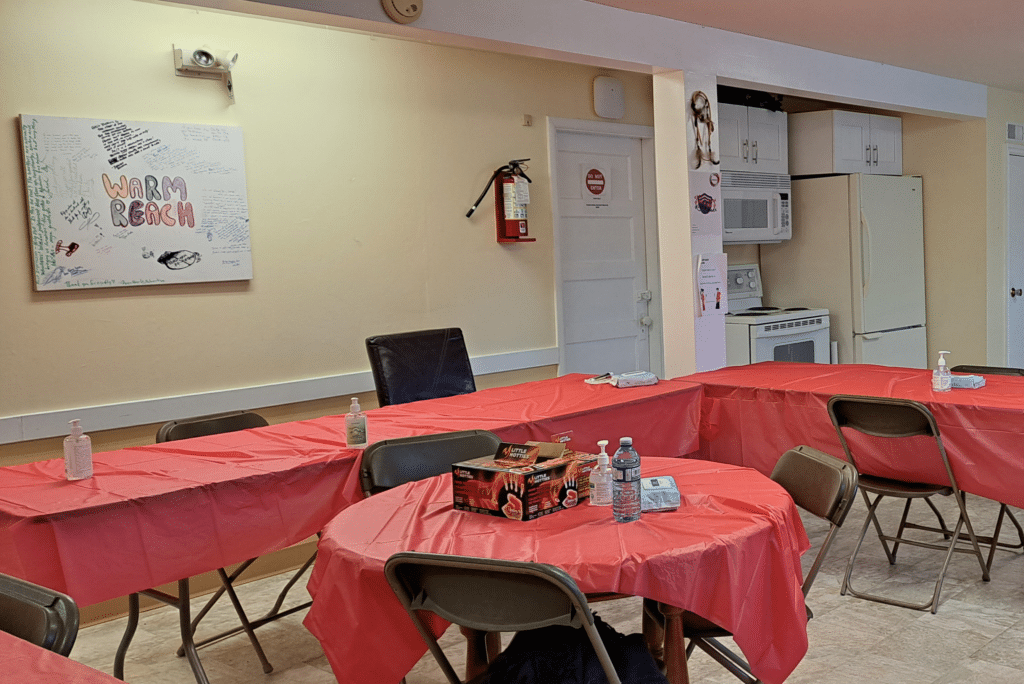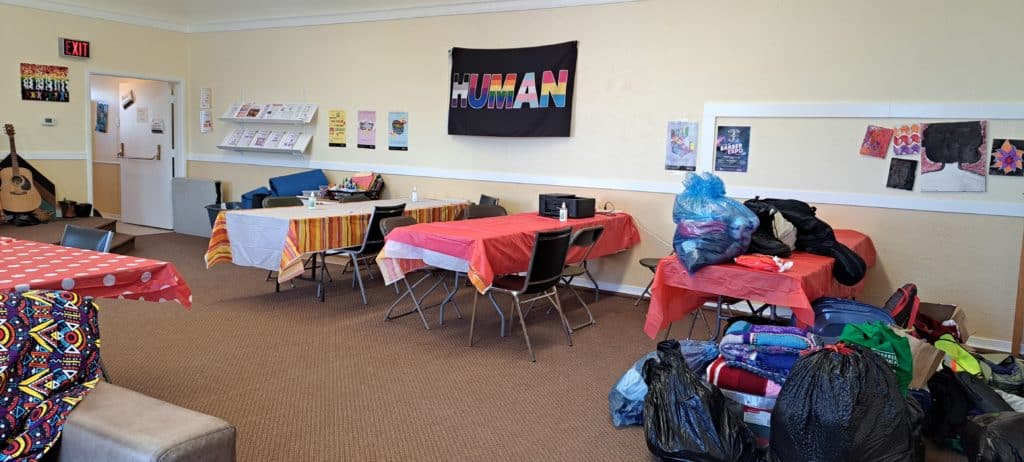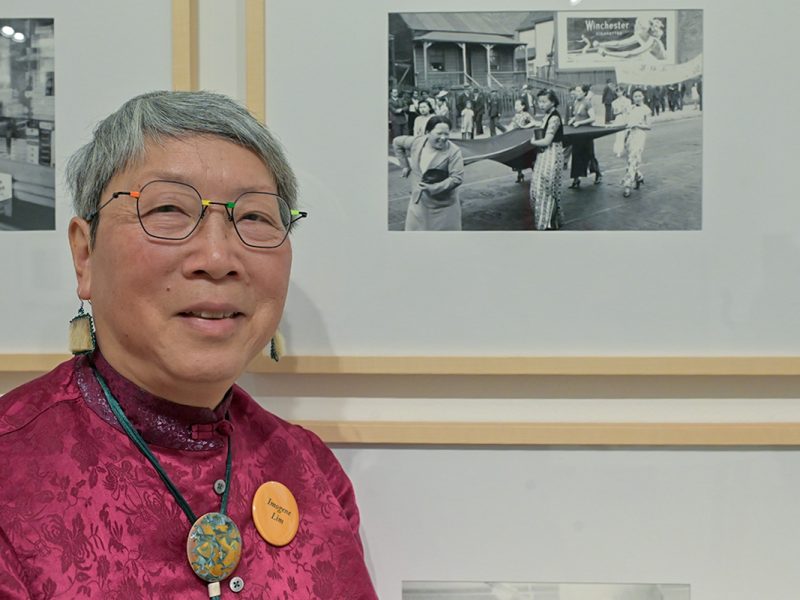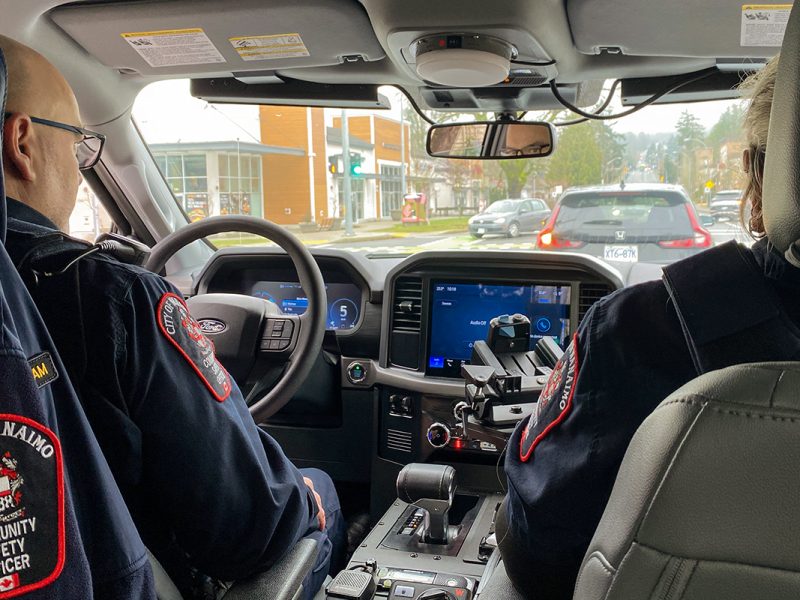
When a late November winter storm pummeled the Island, Nanaimo-based RISEBRIDGE Society pulled from past experience to reopen their warming centre on an emergency basis, without adequate funding, to provide a safe space for unhoused and at-risk residents.
As temperatures slowly dropped, the city had been directing people needing day shelter to the nearest library or recreational centre instead.
With the snow turning to ice, on Nov. 30, RISEBRIDGE welcomed the sudden announcement that funding for their WarmReach warming shelter had been granted after months of advocacy, funding applications and talks with the city.
WarmReach is now preparing to be open seven days a week, and a warming centre operated by the 7-10 Club Society will open Monday to Friday at St. Paul’s Anglican Church. Both centres will run from December to March. It’s not yet clear if they will be converted to cooling shelters or if they will return for December 2023.
While the newly announced financial support is a much-needed step toward creating permanent day shelter and drop-in services in Nanaimo, RISEBRIDGE says the repeated hurdles are a drain of energy on a small organization already stretched to breaking point.
‘We had drop-offs from the RCMP’
RISEBRDIGE was founded in November 2020 as a community outreach organization focusing on supporting Black and Indigenous residents with enrichment activities and day-to-day resources.
Roughly 33 per cent of people experiencing homelessness in Nanaimo identified as Indigenous in the latest point-in-time count, though Indigenous people represent about eight per cent of the population.
Last December, RISEBRDIGE stepped up to provide emergency services after reports of internal fraud shuttered central Vancouver Island’s only day warming shelter.
The need for permanent day shelter and drop-in services was noted in Nanaimo Homelessness Coalition and United Way’s 2018 action plan to end homelessness.
Current shelter services in the city close during daytime hours, leaving residents out on the street. “The persistent wearing out of the body is one of the defining condition of homelessness,” the report states. “When temperatures plummet, the need for shelter is a matter of survival.”
But by Nov. 29 of this year, as a winter storm ground much of central Vancouver Island to a halt, no official warming centre was in place.
Jovonne Johnson, executive director of RISEBRIDGE, spoke with The Discourse on the race to fill the need. “Island Health outreach teams have been supporting us and the community and kind of asking us to operate. So, we decided to open ourselves,” she says over the phone, noting they had passed the safety inspection from the city.
On the morning of Nov. 29, as the snow continued to fall, RISEBRIDGE opened up their WarmReach shelter, located in the basement of their 520 Prideaux St. centre.
Word had quickly spread through outreach teams and health agencies that RISEBRIDGE had a place for people to shelter in, Johnson recounts. By 10:00 a.m. the shelter was nearing capacity and a line-up had formed.
“We had drop-offs from the RCMP who were trying to look for places for people to go. And we had individuals being sent here from several outreach teams, including Island Health navigation teams. It just continued. Within half an hour, we were already at operating capacity.”
That same day, when asked to provide an update on the status of warming centres, Lisa Brinkman, City of Nanaimo’s manager of community planning, told The Discourse they have been working to access funding from the province to support warming and cooling services through the newly formed Nanaimo Systems Planning Organization (SPO).
The SPO was developed out of the city’s 2021 Health and Housing Action Plan and aims to coordinate the various groups working to prevent and respond to homelessness to make best use of limited resources, as noted in the SPO’s charter.
This allows the city to more easily access provincial and federal funding to then be directed toward city organizations.
“The SPO is still in its early stages. I can’t say that there’s action that’s coming from there yet, it just takes time to get things rolling,” Brinkman said in a phone interview. “In the meantime, we as staff have been doing our part with council support.”
As the City of Nanaimo focused funds and time on developing the SPO, the need for warming centres became more and more apparent.
On Nov. 29, as RISEBRIDGE worked to secure emergency support, they reached out to provincial and federal contacts. But timely support could only be granted if WarmReach operated as an overnight or 24-hour service. This meant acquiring sleeping supplies and assuring volunteers and staff could be on site at all times.
“We set ourselves up to potentially operate for 24 hours as we waited for the province to confirm if we met requirements or not,” says Johnson.
That confirmation would never come. Johnson was told an answer would be provided by office closing hours, but by 4:30 p.m. learned that all offices had closed early so staff could get home safely as weather deteriorated.
“The decision was made, we didn’t have the heart to kick anyone out in the weather,” she recalls of the first evening WarmReach opened its doors.

RISEBRIDGE asked those who had confirmed space at at Unitarian and St. Peters night shelters to make their way, with hopes that the night shelters would open early as promised.
Those who had access to tent shelters were advised to check they were in good repair before the weather became too treacherous. Once shelter arrangements had been made for anyone with access, WarmReach had 18 individuals without access to overnight shelter.
“[They] have no tents, no tarps and no shelter spaces to go to. As a group of caring moms and community volunteers, we’re not going to kick those individuals out into the snow just because we haven’t been approved for 24-hour operation, because our building doesn’t meet code. We’re being put in that ethical dilemma once again.”
Why the delay in funding warming centre services?
The funding for WarmReach and 7-10 Club announced by the city on Nov. 30 came from the Strengthening Communities’ Services Program, which is supported by the provincial and federal governments.
The program aims to support people who are living without shelter and recently helped launch a new breakfast service offered by the Salvation Army, a resource Brinkman says fills one more gap in the patchwork of support. “That was to get people inside sitting down for a hot breakfast each day,” she says.
Part of the $625,000 awarded for 2022 has also gone towards the Snuneymuxw Hulit Lelum’s Homeless Outreach Team Support as well as community policing volunteer supports.
Half of this year’s funds, $299,000, was earmarked for warming centre services this winter and cooling for the summer of 2023, Brinkman explains.
Brinkman notes that the City of Nanaimo has been working with RISEBRIDGE to grant them approval for the funding. “It involves a lot of different contract negotiations with the organization,” she says.
Details related to the operations, resource capacity and current funding amounts needed to be provided first, according to the city.
Meantime, bylaw officers had been instructed to direct unhoused residents in need of shelter to the nearest Vancouver Island Regional Library location, coffee shop or fast food restaurant.
“The city has been in communications with the local libraries,” Brinkman told The Discourse prior to the funding announcement. “And they are and have confirmed that they are comfortable offering that. Also the lobbies of the city’s recreation centres are always available for warming as well.”
When asked about the direction to use libraries for emergency shelter, David Carson, a Vancouver Island Regional Library spokesperson stated in an email: “Vancouver Island Regional Library’s three Nanaimo branches are open and welcoming to anyone in the community, including people in need of a warm, dry space during cold weather, as long as our Rules of Conduct are adhered to.
“While we are not currently able to provide the breadth of services required to be designated as an official Warming Shelter, we look forward to working with our friends at the City of Nanaimo to explore the options, within our respective mandates, available to us in the future.”
The Discourse asked Brinkman if City of Nanaimo staff working at such recreation centres have the training and resources to deal with psychological and medical needs. Brinkman acknowledges that more could be done.
“Not everyone may be well suited for warming in the lobbies of recreation centres. It is a risk that yes, the city is willing to take on. It’s a balance that we need to strike. Services should be available for city staff…RCMP is always close by and our bylaw officers close by.”
People who use shelters in Nanaimo have reported the library as the service they use the most, the 2018 homelessness action plan states. “[People experiencing homelessness] deserve public settings and communal spaces that account for their unique needs and social relations.”
While Johnson is relieved that their many months of contending for funding were successful, the hurdles are taxing. “We do not have the capacity for this back-and-forth dance,” she says. “I work a full-time job on top of operating RISEBRIDGE. Our staff, our volunteers, we do not have the energy and resources.”
‘Everyone keeps saying, Thank you so much.’

When asked what RISEBRDIGE was hearing from other service providers, city staff, and from the general population since WarmReach re-launched, Jovonne sighs with a level of far too familiar exhaustion.
“Everyone keeps saying, ‘Thank you so much. We don’t know what else to do right now.’ The same thing happened last year. That stretched our organization and staffing to complete capacity,” she says.
For some, it could be considered a survivable reprieve as RISEBRIDGE and 7-10 Club work to become fully operational with newly acquired funding.
A glaringly obvious question arises on whether the new warming centres will provide enough for the more than 400 residents who are unhoused in Nanaimo.
Current night shelters include Salvation Army’s New Hope Centre with a maximum of 35 shelter beds for men, First Unitarian Fellowship with a maximum of 27 shelter beds, St. Peters Winter shelter with 25 shelter beds and an additional six during extreme weather conditions, Island Crisis Care Society’s Samaritan place with 14 beds for women and Friendship Lelum Youth Safety House for youth 12 to 18. This still leaves hundreds of residents without shelter.
Day-use warming centre spaces listed on the City of Nanaimo website include Salvation Army’s New Hope Centre, which is only available for current shelter guests to use, Vancouver Island Regional Library branches, Canadian Mental Health Associations Bastion Street Social Centre, recreational centre lobbies, and the newly supported RISEBRIDGE WarmReach centre and 7-10 Club St. Paul’s Anglican Church location.
“It would be great if we could have got this done sooner. But it is what it is,” says Brinkman. “Certainly the city would love to eventually have a more permanent building or location. Even several more locations specifically for that. But for this year, in the meantime we do have shelters open.”
Nanaimo isn’t the only community struggling to deliver emergency shelter services. Across the province, from Kamloops to Victoria, shelter operators say they’re scrambling to meet the needs of community members in face of red tape, a lack of funding and shortage of staff.
As of Dec. 8, Johnson says the funding has still not been provided to RISEBRIDGE, as more requirements were laid out in the contract. One of the larger requests is upgraded insurance.
“We have requested 15 per cent [of the funds] to be released to us as soon as possible to cover our basic costs as soon as we have met the service agreement requirements, hopefully tomorrow!” Johnson updated The Discourse in an email. “Even with the grant amount, I think it’s important to note that it still won’t cover all of our operation costs or needs.”
Fundraising efforts will continue, she adds, along with requests for community donations. Johnson feels confident that the working relationship formed between RISEBRIDGE and other organizations will deliver.
When asked what final words she had during the interview, Brinkman said, “We’re really grateful for our community partners, to nonprofit organizations who are stepping up and helping. We’re all in this to help together.”



